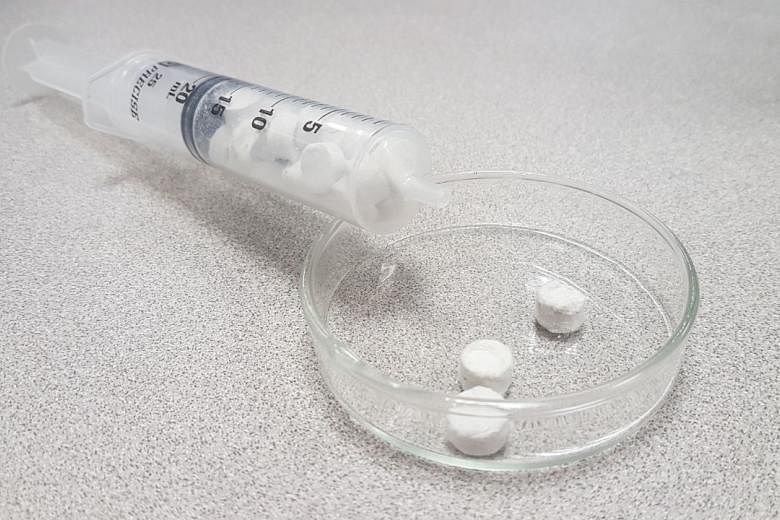SINGAPORE - The clothes that you throw out can be turned into a material that may come in handy next time in a life and death situation.
For disused cotton fabric have found new life in the hands of local scientists, who have turned them into a material that can stop rapid bleeding.
The fabric can be turned into a highly absorbent cotton aerogel that can absorb blood three times faster than the sponges used to stem bleeding from gunshot wounds and other deep wounds.
The creators of the cotton aerogel, Associate Professor Hai Minh Duong and Professor Nhan Phan-Thien from the National University of Singapore, released their findings to the media on Wednesday (Jan 24). Details of their novel application were published in the scientific journal Colloids and Surfaces A earlier this month.
Aerogels were first created in the 1930s and are made of materials including wood and glass fibres. Aerogel pellets are used to stop the bleeding in a gunshot wound and clean up oil spills, among other things.
But they are not used widely as they are expensive to make due to costly equipment and lengthy fabrication time.
Prof Duong said on Wednesday that cotton aerogels can be made in just eight hours, a lot faster than the time needed currently to create aerogels - making them cheaper to produce.
"They are also stronger, making them more suitable for mass production," he added.
Prof Duong said a tiny cotton aerogel pellet, about 1cm in diameter, can expand to 16 times its size in 4.5 seconds. About five to six are needed to stop bleeding in a gunshot wound.
Aerogels are also good thermal insulators.
The NUS research team has collaborated with DSO National Laboratories, the largest defence research and development organisation here, to develop a lightweight thermal jacket for water bottles.
The jacket can help to maintain the temperature of ice slurry - crushed ice and liquid water - in military water bottles at -2 deg C for four hours. Currently, military water bottles can keep water cold for only about 30 minutes in the local tropical climate.
The thermal jacket, which weighs about 200g, consists of a cotton aerogel layer embedded in common fabrics to provide heat insulation.
The thermal jacket cost about $8 to make. A vacuum flask bottle usually used to keep drinks cold for hours cost about $90 on the market.
Prof Nhan said: "The heat insulation property of the novel cotton aerogels can be applied to various consumer products, such as cooler bags to keep food items fresh."
He said the cotton aerogel could be used to insulate pipelines and transport liquefied natural gas, which needs to be stored at a low temperature.
The team is in discussions with a Singapore and US company to commercialise the cotton aerogel.
Commenting on the research, Professor Brian Wardle, of the Massachusetts Institute of Technology, said the work introduces a "very forward-thinking and eco-friendly synthesis route for aerogels that can utilise common and abundant cloth waste streams".

